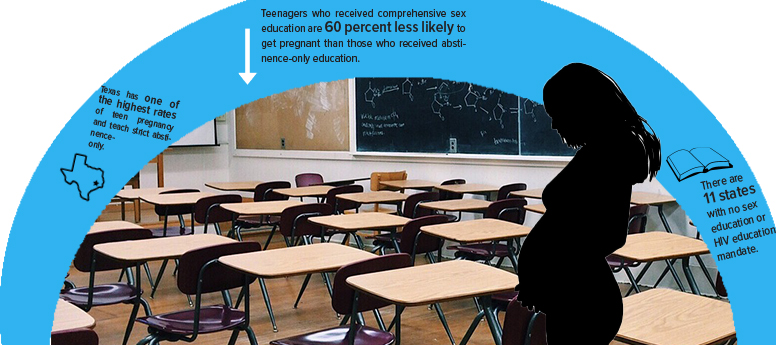American schools do not adequately address sexual health to youth
Sex. How many of you feel uncomfortable from reading that word in the classroom? Well, it’s time to start talking about it.
Simply put, ignoring teen sex doesn’t mean it is not happening; it just means teens are not prepared.
Sex remains a taboo in America. Perhaps it is due to our Puritan roots, or maybe just an unwillingness to budge on this topic when it seems like everything else is changing. Regardless of the reasoning, it is clear that this taboo is harming our youth, not helping.
There is a clear connection between contraceptive use and lower pregnancy and STD exchange. In 2008, there were about 3.4 million American women who had unintended pregnancies. Only 5% of these pregnancies occurred with consistent use of contraceptives. 54% of these pregnancies occurred after no use of contraceptives, and the remaining 41% occurred with infrequent use, according to the Guttmacher Institute.
Seems simple, right? Use protection, and you’ll be protected. It seems that message is not reaching the youth here in the U.S. as it should be, and that is largely because Americans (as well as people of many other countries) refuse to talk about it adequately.
In fact, the National Center for Biotechnology Institute (NCBI) found that, of 48, states studied, 21 of them stressed abstinence-only sex education. Yep, that means no condoms on cucumbers.
We’re Americans: if you tell us not to do something, we just want to do it more. Rather than telling kids “no sex,” tell them “safe sex, consent, respect.” It’s clear that the simple message of “no sex,” abstinence only education, is not working. Abstinence-only education has proven to be largely ineffective in not only preventing teenage pregnancy and STDs, but also in delaying the age of sexual intercourse, according to the NCBI.
After conducting a study comparing sex education laws and teen pregnancy, the NCBI found that level 1 states (states with abstinence and comprehensive sex education covered) had significantly lower teen pregnancy rates than level 3 states (states which stressed abstinence-only education).
Teaching abstinence can help, but only when it is accompanied by other sex ed methods and a broader discussion of sex itself. If this valuable education is not reaching kids in school, it needs to come from the parents.
If sex is not discussed, it is alienated. Sex is a natural part of life. Yes, there are differences in opinions about when and who is appropriate, but teenagers should be making these choices with the guidance of their parents rather than being shunned or cut off.
While I understand parents’ concern for their children, I also think it’s important for parents to realize that this is not their decision. You can give your teens protection, and you can inform them, but you can not make decisions for your children. All you can do is give them the best advice you have, and hope they use their wits.
It’s time for America’s parents to dig a little deeper than the birds and the bees.





Deana • Jul 29, 2018 at 3:04 pm
I love this article and the bluntness of it, as well as the research put into it! (Also the last line is awesome) I found your paper through a list of Sno apps and yours is the best by far that I’ve seen. Kudos to a great web design!